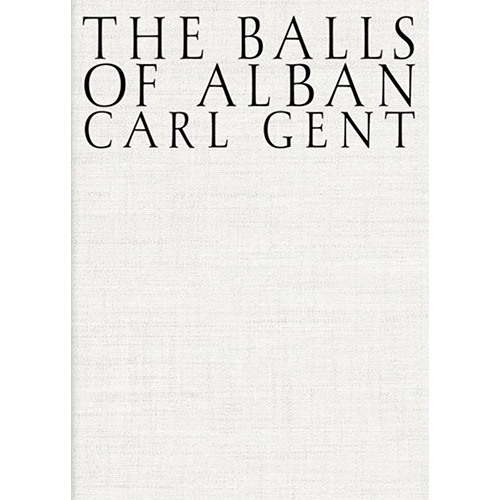Carl Gent
The Balls of Alban

Strip poker, decapitated heads, Bexhillian bowls and Cynethryth, eighth century Queen of the Mercians. The Balls of Alban is every which way. Narrative interpreted towards whatever you want it to be.
The opening story follows a third century game of homeopathic strip poker with Saint Alban, the first-recorded British Christian martyr.
The stories re-fictionalise a period that falls into a void of unknowing. History is always lost yet it can always be re-historicised. It’s difficult to know what this is, following something that is surreal but could entirely be real. The casual nature of that which is unwritten, the mundane becoming as interesting as you like.
The stories sculpt an impermanent image, one that can be rewritten as many times as possible until it becomes something different, thousands of times over. Truth is what you make it. How weird is not weird, how real is not real? You can be playing any game you want. The book phases in and out of the trans cosmic game of strip poker. Thoughts are heard and echoed. St Alban guarded by time, yet eternalised by legend. How else do you win a game of strip poker?
The second half of the book is written more like a biography. A biography of missing pieces, spurred by the idea that history remains unwritten by default. This notion is personified by Gent’s portrayal of Cynethryth, Queen of Mercia over 1200 years ago. She is a woman for which very little is known and that which is known cannot be regarded with much certainty. Her life is a blend of metaphor, fable and myth.
Historical lives always remain in a state of perpetual discourse. Gent presents a series of texts that are surviving artefacts and evidence of her life. The writings further distort the image of the Queen. They sculpt her into their own image, exposing their own agency, the problem is everything.
The only Anglo-Saxon queen to be minted upon a coin. An idol of forever.
The opening story follows a third century game of homeopathic strip poker with Saint Alban, the first-recorded British Christian martyr.
The stories re-fictionalise a period that falls into a void of unknowing. History is always lost yet it can always be re-historicised. It’s difficult to know what this is, following something that is surreal but could entirely be real. The casual nature of that which is unwritten, the mundane becoming as interesting as you like.
The stories sculpt an impermanent image, one that can be rewritten as many times as possible until it becomes something different, thousands of times over. Truth is what you make it. How weird is not weird, how real is not real? You can be playing any game you want. The book phases in and out of the trans cosmic game of strip poker. Thoughts are heard and echoed. St Alban guarded by time, yet eternalised by legend. How else do you win a game of strip poker?
The second half of the book is written more like a biography. A biography of missing pieces, spurred by the idea that history remains unwritten by default. This notion is personified by Gent’s portrayal of Cynethryth, Queen of Mercia over 1200 years ago. She is a woman for which very little is known and that which is known cannot be regarded with much certainty. Her life is a blend of metaphor, fable and myth.
Historical lives always remain in a state of perpetual discourse. Gent presents a series of texts that are surviving artefacts and evidence of her life. The writings further distort the image of the Queen. They sculpt her into their own image, exposing their own agency, the problem is everything.
The only Anglo-Saxon queen to be minted upon a coin. An idol of forever.